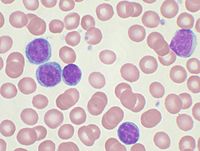
Photo from wikipedia
Background Although chronic lymphocytic leukemia is basically a B cell disease, its pathophysiology and evolution are thought to be significantly influenced by T cells, as these are probably the most… Click to show full abstract
Background Although chronic lymphocytic leukemia is basically a B cell disease, its pathophysiology and evolution are thought to be significantly influenced by T cells, as these are probably the most important interaction partner of neoplastic B cells, participating in their expansion, differentiation and survival. Chronic lymphocytic leukemia B cells may also drive functional and phenotypic changes of non-malignant T cells. There are few data about the association between memory T cells and prognosis, especially related to ZAP-70, a common reliable surrogate of the gold standard chronic lymphocytic leukemia prognostic markers. Objective The aim of this study was to investigate whether the expression of ZAP-70 in chronic lymphocytic leukemia patients is associated with abnormal patterns of the distribution of naïve and memory T cells related to crosstalk between these cells. Methods In this cross-sectional, controlled study, patients with chronic lymphocytic leukemia were compared with healthy blood donors regarding the expression of ZAP-70 and the distribution of naïve and memory T cell subsets in peripheral blood as measured by flow cytometry. Results ZAP-70 positive patients presented an increased frequency and absolute number of central memory CD4+ T cells, but not CD8+ T cells, compared to ZAP-70 negative patients and age-matched apparently healthy donors. Conclusions Because central memory CD4+ T cells are located in lymph nodes and express CD40L, we consider that malignant ZAP-70-positive B cells may receive beneficial signals from central memory CD4+ T cells as they accumulate, which could contribute to more aggressive disease.
Journal Title: Hematology, Transfusion and Cell Therapy
Year Published: 2018
Link to full text (if available)
Share on Social Media: Sign Up to like & get
recommendations!